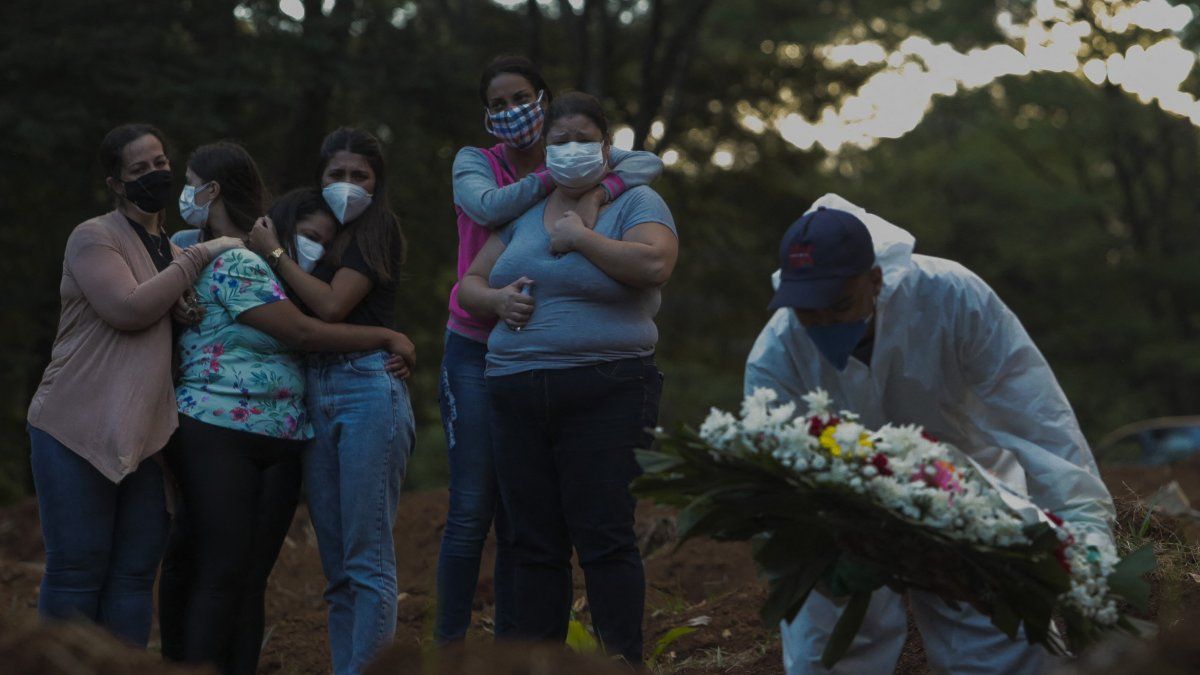
[ad_1]
While Latin America enters the most critical phase of the second wave of the coronavirus pandemic, in Europe there is already talk of a third, the United States is preparing for a fourth peak of infections and, in Asia, the contrast between countries experiencing a fourth wave and others starting to return to normal, such as China, is surprising.
The president of Ecuador, Lenín Moreno, declared a state of emergency for 30 days in the provinces of Pichincha, Guayas, Manabí, Azuay, Loja, Santo Domingo, El Oro and Esmeraldas, with a curfew from April 2 to 9, in addition to control the movement of vehicles.
In Uruguay a new death record has been reached and a total of 1,000 pandemic deaths have been surpassed. The government is awaiting official confirmation on Sunday of the arrival of 48,000 doses of Astrazeneca.
In Brazil they started doing nightly burials before the avalanche of deaths since there were over 3,700 on the last day. Health emergency forces Jair Bolsonaro to advance the payment of state aid and the President of the Brazilian Senate, Rodrigo Pachecho, has asked the UN to anticipate the delivery of the vaccines of COVAX.
In Chile one million cases were reached on Thursday. The hospital network is on the verge of collapse and there is a strong circulation of new variants. 83% of the population is confined and from April 5, both Chileans and residents will be barred from traveling abroad – unless they need it for urgent, humanitarian or health care reasons – as well as the arrival of tourists. There will also be a curfew.
In Paraguay 50 percent of the internees are between 18 and 40 years old and in some regions improvise beds in hospitals. Strong economic crisis among traders. The government is waiting for the 100,000 doses of the Covaxin vaccine from India to be approved by regulatory bodies in Mexico and Brazil (so far the country has only received 63,000 doses from different laboratories).
In Mexico A second batch was received yesterday with more than one million doses of AstraZeneca vaccine from the United States and on Wednesday in a record number, more than 400,000 people were vaccinated in a single day. The government of Colombia announced that negative Covid PCR tests will again be required from April 7 for nationals and foreigners entering the country by air.
The newspaper El País of Spain wrote this Friday a very critical editorial entitled “Europe vaccinates slowly”, in which it affirms that this slow vaccination in most of the countries of the bloc “is costing lives and prolonging the pandemic despite the fact that the best possible weapon already exists: the vaccine ”.
In France it faces further growth in cases with a third nationwide lockdown, which has closed schools, restricted traffic and affected travel between provinces. Vaccination is progressing slowly and has reached 100,000 deaths. Germany is going through the third wave of Covid, with an increase in pronounced cases in recent weeks.
The government has ordered travelers entering the country through any airport to present a negative PCR before boarding. The country’s health authorities have said the health system could collapse during the month of April.
The government italiano will maintain throughout the month of April the tightening measures it is now applying to try to control the transmission curve. Most of the country is in the red zone (more severe restrictions). Right now, Italy requires a negative PCR before boarding a plane, a 5-day quarantine and later another negative test.
In Spain the fourth wave is lived. “The cases in the region will increase in the coming days due to the closing of Holy Week,” said the Minister of Health of the Community of Madrid, Enrique Ruiz Escudero. According to him, Madrid’s population density favors an increase in respiratory diseases such as the coronavirus.
It also released the second extension of the mandatory 10-day quarantine that travelers on flights from 12 countries, including Brazil, Peru and Colombia, must undergo.
Poland, is one of the countries with the worst health situation, with an incidence of 963 cases per 100,000 inhabitants in 14 days. The Polish government announced last week that from Saturday March 27 and for two weeks shopping malls, gymnasiums, nurseries, hairdressers, libraries and other non-essential establishments will be closed.
For its part Sweden will postpone a planned easing of some Covid restrictions to at least May 3. The government had planned to relax some rules, including increasing the limit on the number of visitors to amusement parks, concerts and football matches, after the Easter holidays.
In Hungary there are 1,240 cases per 100,000 inhabitants in 14 days. Until April 8, measures the country has already approved will be in effect, including shutting down non-essential businesses, online courses and curfews. “We are living through the most difficult weeks of the pandemic,” said Viktor Orbán, Hungarian Prime Minister.
For its part United States and Canada reflect an increase in cases following the entry of the British strain on their territories. In Canada, various regions are increasing restrictions and health authorities are indicating that more and more young people are being hospitalized. Quebec, for example, imposed severe restrictions for a week: closed schools, theaters, gymnasiums and hair salons as well. Only essential businesses remain open.
In Asia, the president of PhilippinesRodrigo Duterte extended a strict lockdown in the capital region and adjacent provinces for at least a week to try to contain a further rise in coronavirus infections, his spokesman said on Saturday.
[ad_2]
Source link
 Naaju Breaking News, Live Updates, Latest Headlines, Viral News, Top Stories, Trending Topics, Videos
Naaju Breaking News, Live Updates, Latest Headlines, Viral News, Top Stories, Trending Topics, Videos